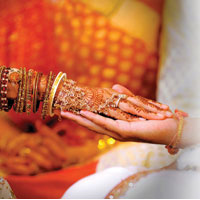Marriage and Immigration
Author by Shirin Rustomji
Marriage to a U.S. Citizen is by far the fastest way any foreign national can obtain permanent residence within the United States as there are no quota restrictions on the number of people obtaining permanent residence through marriage to a U.S. Citizen.
Getting married is one of the most exciting times in our lives. It is the beginning of a new life, including new rights and responsibilities, particularly when marrying a foreign national.
When analyzing marriage and the immigration process, one of the first questions asked of the foreign national is whether they are marrying a U.S. Citizen or a Permanent Resident. Marriage to a U.S. Citizen is by far the fastest way any foreign national can obtain permanent residence within the United States as there are no quota restrictions on the number of people obtaining permanent residence through marriage to a U.S. Citizen. As a result United States Citizenship and Immigration Services (USCIS) approaches marriage petitions to U.S. Citizens with some skepticism.
Unfortunately, the same cannot be said about a foreign national who marry a Permanent Resident. When marrying a Permanent Residence, one must wait for a visa number to become available. The timings vary depending on when the petition is filed and the home country of the foreign national. Often spouses are required to live separate and apart while waiting for their visa number to become available.
The main factors USCIS considers when evaluating a marriage based permanent residence application is whether the marriage is a bona fide one. The factors considered are:
-
Whether the marriage was valid at the time it was entered into;
-
Whether the marriage is still in existence at the time of issuance; and
-
That the marriage was a bona fide one and not entered into for the sole purpose of procuring permanent residence status.
Validity of a marriage is not a specifically defined term under immigration law; however, Congress states that the word “marriage” is a legal union between one man and one woman. As for the second factor, the marriage must stay intact until the time of issuance of the permanent residence card or “green card”.
As for evaluation of a bona fide marriage, in light of the growing number of marriage fraud cases, USCIS takes a very close look at the intent of the parties’ entry into marriage. It is very important to document your file with pointed evidence of a bona fide union between you and your spouse. Some examples of documentation used to evidence a bona fide marriage are joint banking statements, joint credit card statement, joint real estate purchases, joint health/car/life insurance, children to the marriage, etc. In addition, the wedding ceremony can be very telling to immigration officers. A ceremony attended to by your friends and family tends to have more validity.
The process of obtaining permanent residence through a marriage petition application can be smooth and uneventful so long as you have complied with all requirements of USCIS. Generally, once all of the documentation is completed in full and filed with the appropriate office, USCIS will require that biometrics are taken. Biometrics is where the beneficiary or foreign national will be required to have his or her fingerprints and photo taken. Once the biometrics is complete, an interview will be requested by USCIS. Immigration Officers approach every interview individually and treat them as unique as no two couples are the same. There is not a standard set of questions that they ask, but it is important to remember that their goal is to establish a bona fide marriage. Often Officers will separate the couple and ask similar questions to both as an evaluation of the bona fide marriage. If all of the couples paperwork is in order and the Officer is satisfied that the marriage is a bona fide one, permanent residence is generally issued the same day. Of course the actual permanent residence card or green card will be mailed to the beneficiary at a later date.
Please remember that any advice provided in this article may not apply to your specific situation, and the only way to receive legal advice pertinent to your specific case is by speaking with a qualified attorney who will review your specific case.
Shirin Rustomji, Esq. has been practicing immigration law for approximately five years. She is from Canada and as such is personally familiar with the immigration process. In addition to practicing immigration law, Ms. Rustomji also practices in the area of marital and family law. If you have any questions about any immigration matter, not just marriage based permanent residence petitions, please call 813-288-0100, e-mailshirin@bdrfamilylaw.com, or visit www.bdrfamilylaw.com.































